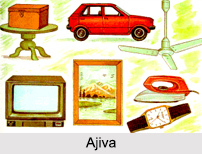 Ajiva in Jainism is the one which does not have the capacity to know. The lifeless, inert matter is called Ajiva. It is the object in relation to the individual soul or the Jiva, which is the subject. If Jiva is the living reality, Ajiva represents the inanimate reality. According to Jainism, the whole universe is made up of basically these two fundamental realities. They are like the body and soul or the day and night of existence. It cannot be said that one is more important than the other because both are interdependent.
Ajiva in Jainism is the one which does not have the capacity to know. The lifeless, inert matter is called Ajiva. It is the object in relation to the individual soul or the Jiva, which is the subject. If Jiva is the living reality, Ajiva represents the inanimate reality. According to Jainism, the whole universe is made up of basically these two fundamental realities. They are like the body and soul or the day and night of existence. It cannot be said that one is more important than the other because both are interdependent.
Types of Ajiva
Ajiva is found in five different types. They are;
1. Pudgal Dravya: Matter
2. Dharma Dravya: Principle of Motion Assistance
3. Adharma Dravya: Principle of Rest or Equilibrium Assistance
4. Akasha Dravya: Space
5. Kala Dravya: Time or Assisting change
Pudgal Dravya: Of these five Ajiva Dravyas, Pudgal Dravya is the only one that is material in nature. It has the corporeal qualities like colour, smell, taste and touch. This is made up of atoms and molecules. It is the clay of existence found ubiquitously in all perceptible objects, bodies and their parts.
Dharma Dravya: Dharma Dravya is the principle of motion, without qualities. It is the "medium of movement for the objects, like water, although not its cause".
Adharma Dravya: Adharma Dravya is the principle of rest. It is also devoid of qualities and acts as the medium of rest, like the shadow, but not its cause.
Both Dharma and Adharma have none of the properties of matter, but they are self-sustaining universal realities in which beings and objects are able to move and rest according to their own qualities.
Akasha Dravya: Akasha Dravya provides the field for other substances to exist. Space is an all pervading and infinite reality.
Kala Dravya: Kala Dravya is another fundamental reality which supports all the changes and modifications to which both Jiva and Ajiva are subject, without causing them. Modifications to Jiva and Ajiva happen because of the mere presence of time, which can be measured in units of time.
Due to ignorance the Jiva identifies itself with the material body. This wrong identification and consequent activities of mind, body and speech are the main causes of bondage of material Karmas by the Jiva. The material Karmas that the Jiva binds constitute a subtle body called "Karmana Sharira" (Body). New Karmic particles are assimilated into the Karman Body and some old Karmic particles dissociate from the Karman Body depending upon the Bhava and subsequent activities of the soul. Karma is Ajiva - inert. It is Jiva which invites Karma. The concern about Pudgal is also on account of the fact that the material body and various objects of sense pleasures are mainly instrumental in the bondage of Karma and consequent misery. Basically it is the soul which is a doer and enjoyer of its deeds.




















